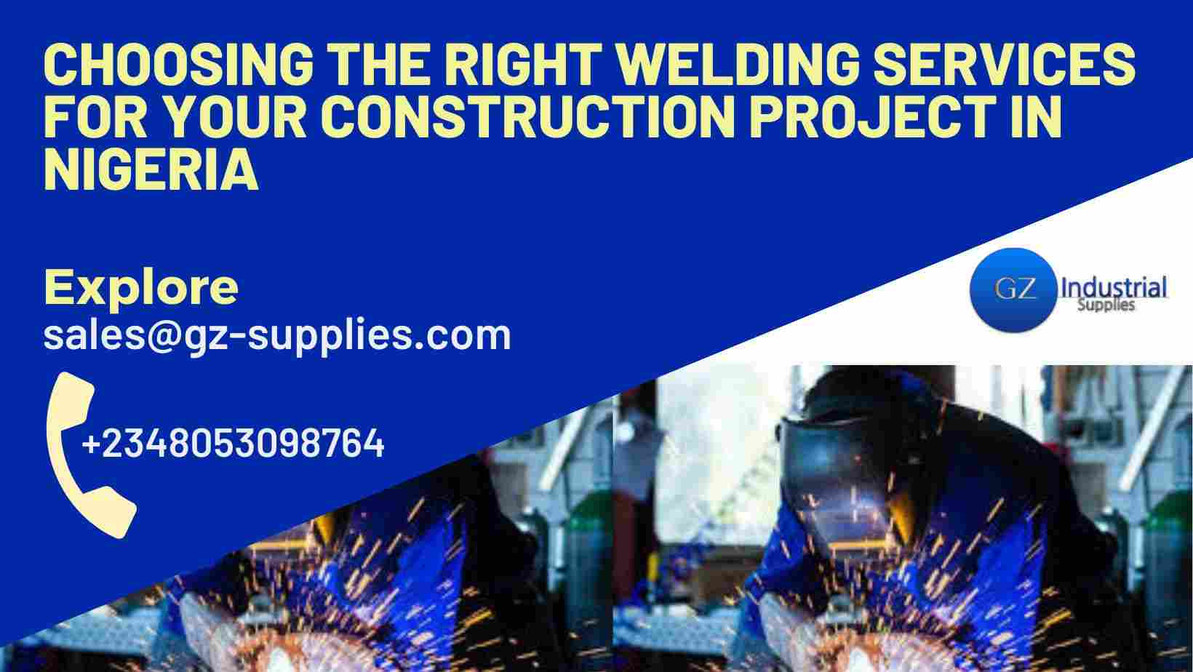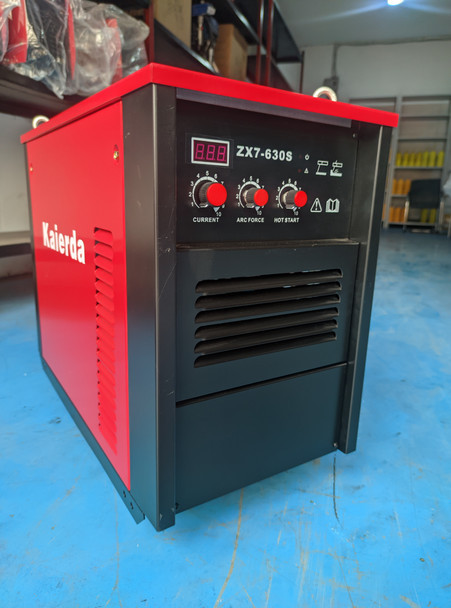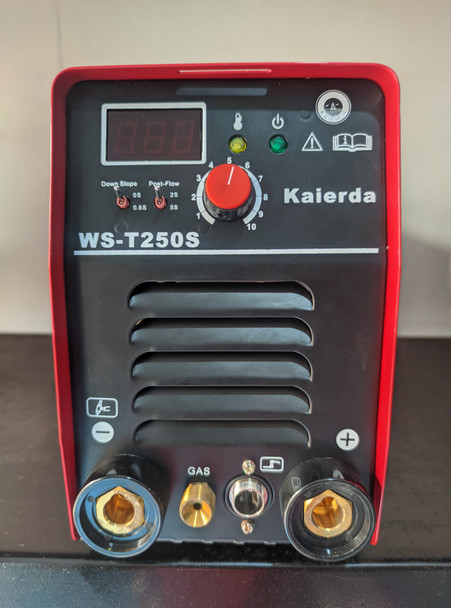Choosing the Right Welding Services for Your Construction Project in Nigeria
- Selecting the right welding services involves evaluating their capability to handle the specific requirements of your project.
- Key criteria include the provider's technical expertise, quality of equipment, track record, and their ability to meet safety and regulatory standards.
Introduction
Welding plays a crucial role in construction projects, serving as the backbone for assembling and securing metal frameworks that support structures like buildings, bridges, and towers. The quality of welding directly impacts the strength, durability, and safety of these structures, making it essential to choose the right welding services.
In Nigeria, construction projects face unique challenges, including the availability of skilled welders, adherence to international quality standards, and logistical issues due to the local infrastructure. These factors complicate the selection of welding services, requiring careful consideration to ensure successful project outcomes.
One of the ways to choose the right welding services is to evaluate the quality of workmanship, this can be assessed by reviewing portfolios of completed projects and seeking references or testimonials from past clients. High-quality welding not only ensures structural integrity but also contributes to the longevity of the construction, minimizing future repair costs.
 Kaierda Inverter Manual Arc Welding Machine (ZX7-630S): Power Meets Efficiency
Kaierda Inverter Manual Arc Welding Machine (ZX7-630S): Power Meets Efficiency
Types of Welding Used in Construction
Understanding Welding Services
Welding plays a vital role in construction projects, where metal components and structures are fabricated and assembled to create buildings, bridges, infrastructure, and more. Different welding techniques are employed based on factors such as the type of material, thickness, joint configuration, and environmental conditions. Three common types of welding used in construction are MIG welding, TIG welding, and stick welding.
1. MIG Welding (Metal Inert Gas)
MIG welding, also known as gas metal arc welding (GMAW), is a versatile and widely used welding process in construction. It utilizes a consumable electrode wire fed through a welding gun, along with a shielding gas, typically a mixture of argon and carbon dioxide, to protect the weld pool from atmospheric contamination. MIG welding is valued for its speed, efficiency, and adaptability to both indoor and outdoor conditions. It is commonly used for welding steel, stainless steel, and aluminum components in a variety of construction applications, including structural steel fabrication, metal fabrication, and automotive manufacturing.
2. TIG Welding (Tungsten Inert Gas)
TIG welding, also known as gas tungsten arc welding (GTAW), is a precise and versatile welding process widely used in construction for producing high-quality welds on thin materials. TIG welding uses a non-consumable tungsten electrode and a separate filler rod, with a shielding gas, typically argon, to protect the weld area from atmospheric contamination. TIG welding is known for its ability to produce clean, precise welds with minimal spatter, making it suitable for welding materials such as stainless steel, aluminum, and copper alloys. It is commonly used in applications where weld quality, aesthetics, and precision are critical, such as aerospace, automotive, and architectural fabrication.
3. Stick Welding
Stick welding, also known as shielded metal arc welding (SMAW), is a versatile and widely used welding process in construction, valued for its simplicity, versatility, and effectiveness in outdoor environments or with dirty or rusty materials. Stick welding utilizes a consumable electrode coated with a flux that generates a protective gas shield around the weld pool, preventing atmospheric contamination. Stick welding is suitable for welding a wide range of materials, including carbon steel, stainless steel, and cast iron. It is commonly used in construction applications such as structural steel fabrication, pipeline construction, and repair work.
Understanding the different types of welding used in construction enables contractors, fabricators, and welders to select the most appropriate welding process for their specific applications and project requirements. Whether it's MIG welding for speed and versatility, TIG welding for precision and quality, or stick welding for versatility and effectiveness in challenging environments, each welding technique has its unique advantages and considerations in construction projects.
 Esab Stick Welding Electrode E6013 Sureweld series: Achieve Flawless Results & easy Weldability
Esab Stick Welding Electrode E6013 Sureweld series: Achieve Flawless Results & easy Weldability
Assessing Welding Service Providers
Certification and Qualifications
It's crucial to ensure that the welding service provider has welders who are certified by recognized bodies such as the American Welding Society (AWS) or the Nigerian Institute of Welding (NIW). Certification is a testament to the welders' skills and knowledge, aligning with global and local safety and quality standards.
Experience in the Construction Industry
Experience specifically in construction welding is invaluable. Providers with a solid track record in the construction sector are likely to understand the complexities and pressures of construction projects, from structural requirements to tight timelines, and offer solutions that are both effective and efficient.
Key Considerations for Choosing a Welding Service
1. Quality of Workmanship
Evaluating the quality of workmanship is crucial when selecting a welding service. You can assess this by reviewing portfolios of completed projects and seeking references or testimonials from past clients. High-quality welding not only ensures structural integrity but also contributes to the longevity of the construction, minimizing future repair costs.
2. Compliance with Safety Standards
Safety is paramount in construction projects, and choosing a welding service that adheres strictly to safety standards is essential. Ensure that the service provider has a proven track record of following safety protocols, including the use of appropriate personal protective equipment (PPE), regular safety training for their staff, and a clear accident prevention strategy.
3. Use of Technology and Equipment
The technology and equipment used by the welding service are indicators of their capability to deliver high-quality results. Advanced welding equipment that is well-maintained reduces the likelihood of project delays and defects. Additionally, providers who invest in the latest technology are often more efficient and capable of handling complex welding tasks.
 Kaierda Inverter TIG/MMA Welding Machine WS-T250S: Unlock Versatility and Precision
Kaierda Inverter TIG/MMA Welding Machine WS-T250S: Unlock Versatility and Precision
Cost Considerations
1. Understanding Pricing Models
Understanding how welding services structure their pricing is important for budget planning. Most services will charge based on the extent of the job, the type of welding required, and the materials used. Some might also offer project-based pricing, which can be more cost-effective for larger or longer-term projects.
2. Balancing Cost with Quality
While cost is an important factor, it should not be the sole criterion for selecting a welding service. Opting for the cheapest provider can often lead to compromised quality and safety. It's vital to balance cost with the quality of workmanship and the service's safety record to ensure that the welding contributes positively to the project's overall success.
Logistics and Project Management
1. Coordination with Other Contractors
Effective coordination between the welding service and other contractors on the project is crucial for ensuring smooth operations. The chosen welding service should demonstrate strong project management skills and the ability to work collaboratively with other teams, adapting to changes and maintaining communication throughout the project.
2. Timeline Management
The ability of the welding service to adhere to project timelines is another critical consideration. Delays in welding can hold up other phases of the construction project, potentially leading to significant cost overruns and logistical complications. Assess the provider's reputation for meeting deadlines and their proactive measures for dealing with potential delays.
 Hellog Multi Purpose Mapp & Propane Torch: Perfect for Brazing, Soldering, and More
Hellog Multi Purpose Mapp & Propane Torch: Perfect for Brazing, Soldering, and More
Legal and Regulatory Compliance
Navigating Local Regulations
Understanding and adhering to local regulations is critical for any construction project. In Nigeria, this means ensuring that the welding service complies with standards set by the Nigerian Institute of Welding (NIW) and other relevant authorities. Compliance not only mitigates legal risks but also assures quality and safety. It's important to verify that the welding service has all necessary licenses and is up-to-date with the latest building codes and safety regulations.
Contractual Obligations
When engaging a welding service, clearly defined contractual obligations help protect your interests and ensure clarity of service expectations. Contracts should detail the scope of work, timelines, payment terms, and quality standards, along with provisions for handling delays, changes in scope, and dispute resolution. Ensuring all agreements are legally binding and thoroughly vetted can prevent misunderstandings and legal complications.
Making the Final Decision
Checklist for Selecting a Welding Service
Before making your final decision, use a checklist to ensure all key factors have been considered:
- Certification and qualifications of the welders
- Experience in similar construction projects
- Compliance with safety and legal standards
- Quality of equipment and technology used
- Financial terms and project cost alignment with budget
- Proven ability to meet deadlines and manage project logistics
Common Pitfalls to Avoid
Avoid common mistakes such as:
- Prioritizing cost over quality and safety
- Overlooking the importance of proper certifications
- Failing to assess the provider's track record with similar projects
- Neglecting to establish clear and detailed contracts
Frequently asked questions (FAQs)
Here are five frequently asked questions (FAQs) related to choosing welding services for construction projects in Nigeria, along with detailed answers:
1. What certifications should I look for in a welding service provider in Nigeria?
Look for welding service providers who are certified by recognized bodies such as the Nigerian Institute of Welding (NIW) or the American Welding Society (AWS). These certifications ensure that the welders have met stringent professional standards for skills and safety.
2. How can I verify the quality of a welding service before hiring them?
You can verify the quality of a welding service by reviewing their portfolio of past projects, requesting client testimonials, and checking if they have relevant certifications. Additionally, conducting site visits to observe their ongoing projects can provide insight into their operational standards and workmanship.
3. What is the importance of having a detailed contract with a welding service provider?
A detailed contract helps clarify the scope of work, timelines, payment terms, and expectations for both parties. It also provides legal protection by outlining the responsibilities and liabilities of each party, including provisions for handling delays, changes, and dispute resolution.
4. Can welding services impact the overall timeline of a construction project?
Yes, welding services can significantly impact the overall timeline of a construction project. Delays in welding work can hold up other construction phases. Therefore, it's crucial to choose a reliable provider with a proven track record of meeting deadlines and to have contingency plans in place for any potential delays.
5. What safety standards should welding services adhere to in a construction project?
Welding services should comply with local safety standards governed by Nigerian safety regulations and international best practices. This includes using proper personal protective equipment (PPE), adhering to fire safety protocols, ensuring all welding equipment is correctly maintained, and conducting regular safety training sessions for all personnel involved.
Conclusion
This guide has outlined the essential steps and considerations for choosing the right welding services for construction projects in Nigeria, emphasizing the importance of quality, safety, cost management, and compliance.
Selecting the right welding service is crucial for the success of your construction project. By carefully evaluating each potential service provider against these guidelines, you can ensure that your project is carried out efficiently, safely, and to the highest standards.
For quality welding tools and supplies, visit GZ Industrial Supplies to explore a wide range of products that meet all your welding needs, ensuring reliability and efficiency for your projects.
Additional Resources
The Essential Guide to Different Types of Welding Techniques
Understanding Metal Properties and Their Impact on Welding Success
Recent Posts
-
Why Serious Mechanics Are Switching to Japanese-Made Shinano Air Tools
Japanese-Made Shinano Air Tools Key takeaway: Shinano’s tight-tolerance, twin-hammer designs d …Apr 24, 2025 -
Top 10 Hand Tool Brands for Professionals
Introduction When it comes to professional hand tools, quality, durability, and reliability are para …Apr 23, 2025 -
HOW DOES CORROSION INHIBITOR WORK
Introduction Corrosion has posed a lot of problems to various companies and industries; by interfer …Apr 22, 2025







